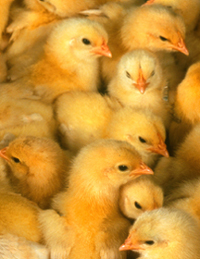Bulletin #2219, Giving Chicks a Good Start

Bulletin #2219, Giving Chicks a Good Start (PDF)
Updated by Donna Coffin, Extension Professor, University of Maine Cooperative Extension, and Michael Darre, Professor Emeritus of Poultry Science, University of Connecticut
By Mahmoud El-Begearmi, Extension Poultry Specialist and H. Michael Opitz, Extension Veterinarian.
For information about UMaine Extension programs and resources, visit extension.umaine.edu.
Find more of our publications and books at extension.umaine.edu/publications/.
Sources of Chicks
First and foremost, get your chicks from a reliable hatchery that is part of the National Poultry Improvement Plan (NPIP). A listing of NPIP participating hatcheries is available through your UMaine Extension County Office. Request that egg or meat-type chickens be vaccinated at the hatchery against Marek’s disease and Coccivac. Chicks vaccinated with Coccivac do not need a coccidiostat in their feed.
Be Prepared Before Chicks Arrive
Clean the brooder house before the chicks arrive. Start by brushing down cobwebs and dust from ceilings and walls. Sweep and wash the floor thoroughly. Scrub the area with a good disinfectant, then air out the building. Cover the floor with two to four inches of clean, dry litter. Dry pine shavings or sawdust and other absorbent materials, such as shredded newspapers, make good litter. Hardwood shavings or hay are not suitable for litter. Make certain the brooder area is free of rats and mice and protected against predators. Start the brooder 24 hours before the chicks arrive to be sure everything is in good working order.
Brooding Temperature
The temperature at the chicks’ level (two to three inches from the floor) should be 95 degrees F through the first week. Then reduce the temperature five degrees each week until you reach a temperature of 70 degrees F. You may turn off the brooder on warm days.
Observe the chicks around the brooder to see if they are comfortable and getting enough heat. If they huddle together, they are cold. If they are spread uniformly under the heat source, they are comfortable. If they stay away from the heat source, they are probably too warm. Chicks need fresh air but avoid draft.
Floor, Feeder and Waterer Space
It is important to provide enough floor, feeder and waterer space. Table 1 lists the recommended guidelines for space for chicks at different ages. These guidelines work in most cases. Even so, observe your chicks to make sure that they have enough room and easy access to feed and water.
For the first week to 10 days, you can feed chicks in cut-down cardboard boxes. The edges should be about 1 1/4 inches high on the sides. Place feed in piles. The chicks will scratch around. After 10 days, provide enough space (see Table 1) so they can all eat at once. Do not fill the feeders more than half full to avoid wasting feed.
Also, if you use fountain-type waterers, provide a one-quart jar for every 16 chicks for the first week, a one-quart jar per 20 one- to four-week-old chicks and one-gallon waterer per 20 chicks at 12 weeks of age. Water is essential for proper growth and development. Fresh, clean water should be available at all times. Clean the waterers each day.
Suggested Feeding Program
Start chicks on an all-mash starter for the first six weeks, at which time they can be changed to a finisher ration (meat-type birds) or to an all-mash grower/ developer (other types of birds). Table 2 lists a simple feeding program for different types of chickens at different ages. Always use fresh feed that has not been stored for more than four weeks.
The organisms known as Coccidia are single-celled protozoan parasites that are species specific. The disease Coccidiosis is a common killer of chickens, especially chicks. Chicks get infected through ingesting fecal matter. Sanitation of waterers, feeders, and facilities can substantially reduce infection of chicks and growing birds. Regular washing of watering and feeding equipment followed by disinfecting is recommended. A medicated feed with a coccidiostat is a conventional method of reducing or eliminating coccidia infection. The use of medication against coccidiosis is recommended in starter and grower feed only. Birds that were vaccinated with Coccivac then no coccidiostat should be in the feed (Get NON-Medicated feed.)
Other more comprehensive feeding programs are also available for small semi-commercial operations. For more information on these programs, please contact your UMaine Extension County Office.
Information in this publication is provided purely for educational purposes. No responsibility is assumed for any problems associated with the use of products or services mentioned. No endorsement of products or companies is intended, nor is criticism of unnamed products or companies implied.
© 1998, 2016, 2020
Call 800.287.0274 (in Maine), or 207.581.3188, for information on publications and program offerings from University of Maine Cooperative Extension, or visit extension.umaine.edu.
The University of Maine is an EEO/AA employer, and does not discriminate on the grounds of race, color, religion, sex, sexual orientation, transgender status, gender expression, national origin, citizenship status, age, disability, genetic information or veteran’s status in employment, education, and all other programs and activities. The following person has been designated to handle inquiries regarding non-discrimination policies: Director of Equal Opportunity, 101 North Stevens Hall, University of Maine, Orono, ME 04469-5754, 207.581.1226, TTY 711 (Maine Relay System).

